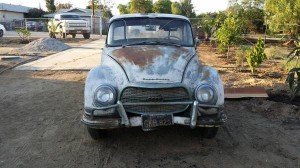
Modern Audis have a long and complicated corporate history as an integral part of German automobile manufacturing going back to the early 1900s and the 1928 merger of four companies that created the large firm then called Auto-Union. In the 1930s their DKW brand offered popular low-cost cars while the Auto-Union brand reflected larger, higher powered cars, and the Audi brand was of only minor importance.
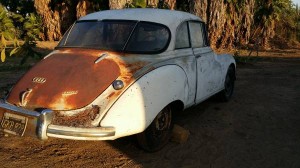
After World War II, when German manufacturing was in ruins and divided between east and west zones, most of Auto-Union’s manufacturing capability was under East German and Russian control. The company that was based in Zwickau in East Germany became the now infamous Trabant, and was manufactured until 1991. In 1949, the Bavarian government underwrote the establishment of a revived Auto-Union DKW, which proceeded to manufacture small front wheel drive cars for the next decade.
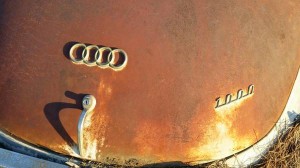
Daimler ended up owning the company for a time, but decided it did not have a profitable future and eventually sold its shares. Ultimately VW ended up with controlling ownership and relaunched the Audi brand in 1965 (and the rest, as they say, has become modern history). Recognize those four interlocking circles?
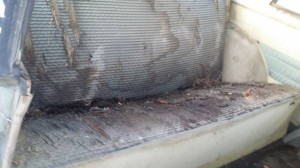
When I was young, I remember having a set of international automobile trading cards that included a picture of a rather nice looking late 50s Auto Union. It’s hard to imagine that very many of these cars were ever imported to the United States. Whatever few there were, there are doubtless not more than a handful left in this country.
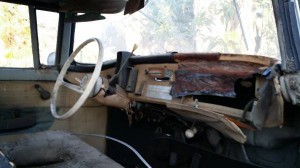
And here we have one such 1957 Auto Union 1000 for sale on craigslist in Perris, California in absolutely terrible condition. The seller knows it’s rare, of course. This car has a three cylinder, two stroke engine and a manual transmission on the column. It’s been a California car all its life, and is claimed to be “cancer free,” and it is possibly salvageable for an ambitious restorer.
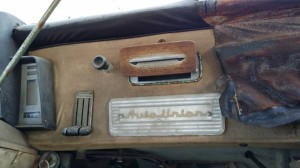
While this car is in really bad condition and needs a ton of work, it has a great look, inside and out.
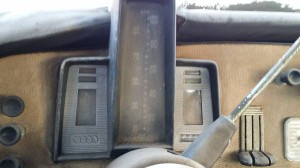
Still, just because it’s rare does not mean it’s valuable, and the cost of rebuilding and restoring this particular car will be far in excess of its potential value, so it will have to be a labor of love. You have to wonder if there is anyone out there with enough love of Auto-Union cars from the fifties, and deep enough pockets to take on this difficult project.
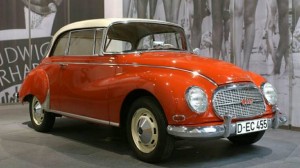
The seller is seeking offers or trades. He shows a picture of what his car should look like when done (bait and switch?) Is anyone here interested in taking on this more or less one of a kind car?






I am very interested in owning it once someone else here has restored it and takes a loss on it so I can get it for thousands under what it cost them to restore it.. er.. I mean..
This would be a labor of love for sure. A perfect one, I thought, would bring $30,000+, but in doing a quick search: http://car-from-uk.com/sale.php?id=39752 Ouch.
There were a lot of those in Brazil when I lived there in 1970. Frequently used as taxis. A lot of them had suicide front doors too. I’m guessing they manufactured them there, as imports were prohibitively expensive.
Didn’t they have a two or three cylinder engine? That’s my recollection anyway. They had that high pitched, tinny, high rev, “wam-mam-mum-mum-mum” sound to them.
Three-cylinder two-strokes, necessitating a mix of gasoline and oil. A-U used the same basic engine design before WWII, and were copied by SAAB in the late 1940s.
I believe all DKWs were manufactured in Germany, though there might have been assembly facilities elsewhere. Quite a few European manufacturers did that.
Thanks, RayT!
Brazil-built DKWs were known as DKW-Vemag. There’s a black and white one at Lane Motor Museum. http://www.lanemotormuseum.org/collection/cars/item/dkw-vemag-belcar-1000-1962
Being an owner of a rare Auto Union 1000 SP coupe [body by Baur, the company that made the original Porsche speedsters – the 1000 SP was known as the “baby 1957 Thunderbird”], I’m familiar with these cars. This one may be titled as a ’57, but they only made them from late ’58 thru early ’60 in Germany. Note that the 1000 was sold as an Auto Union, not a DKW, as prior versions were badged.
However DKW & Auto Union cars continued to be built in Brazil until 1967, and Argentina until 1969.
The 1000 model engine [actually 981cc] was initially a pre-mix fuel in a 1-40 ratio, but later versions had an injection pump to inject the oil below the carb.
Have another drink Ron………..
Ron,
I tink itz a time fur a justment in yuore meds .
WOW! I thought these would be worth way more once restored. Seller will not make a dime off this to someone knowledgeable about these.
Regarding the Audi.
Take off the black Cali plates and crush the remainder.
I have a 45k miles original paint Saab two stroker that I’ll sell you for less the than half the money it will take to get this puppy in any kind of shape.
Hey, about that Saab, Luki.. (I’ve been looking for one)
Scotty G,
It’s (Saab 96) in Cincinnati Ohio in a heated garage waiting for you. Bring a money order and be prepared to have a long ride home.
Top speed maybe 65 and brakes that will stop on a dime and as long as the dime is 100 feet or so from where you intended to stop.
Is it okay if the money order is drawn from a Nigerian bank? Seriously, your Saab would be fun to play with.
Luki, you took the words right out of my mouth. Throw the Sob in the crusher, too.
I’m saying crush the Audi because of condition. If it were a nice original paint and interior car like my Saab by all means preserve it for future generations.
I’d even say preserve a nice low mileage Levi’s Gremlin. I’m thinking you might have one.
So let me follow this logic here:
A rust free car, that needs a paint job , seat and dash cover needs to be crushed, while another original car hanging on by a thread and minimally away from needing a new paint job and seat covers (50+ years old is still 50+ years old) but possibly creeping rust lurking (Cincinnati, Ohio) isn’t ?
Sounds more like bias towards another brand.
And I am guessing we’re talking about the DKW erroneously referred to as Audi.
Started with a ’58 with “suicide doors” (both of which had vertical dents just forward of the rear of the door where the doors had hit the leading edge of the rear fender after opening while in motion) followed by 4 more and finally by law school a 1000SP that looked like a 5/8ths scale Thunderbird. I described the sedans as “looks like a pregnant Volkswagen and goes like one” but of all the cars I’ve owned these were the most fun. From hand painting in the driveway (took 1 quart), to 20 minutes from the time the car stopped in the driveway to having the engine out and totally disassembled, to dealing with 3 coils and 3 sets of points (1 of each for each cylinder) to the fun of “directional ” snow and mud with 15″ wheels, old style big lug snowtires and front wheel drive. Heat (an issue in Canadian winters) was the air blown by the engine fan through the radiator that was mounted atop the transverse leaf spring just in front of the cabin and controlled by levers and flaps.With prices starting at $30 these were the ideal university student used car. Two stroke air mist lubrication meant the center crankshaft bearing frequently starved for oil so if it became sticky and didn’t spin freely after about 30,000 miles ( see above about removing engines) solution was to immerse crankshaft in a 5 gallon pail of oil, cook it on a hot plate for a week or two, turning the offending bearing every other day or so, reinstall and use the oil to mix with the gas as you drove off in a slight blue haze.
Biggest “regret” selling on the 1000SP for $100 (what I paid for it) after I cracked the windshield and found it would be $125 for Speedy Auto Glass to locate, ship and install a replacement. Saw a restored example a few years ago for $15,000 but in the intervening 40 years I probably would have spent much more than that replacing the bottom 4″ of the car that had rusted away.
Have seen restored sedans at Carlisle and elsewhere for very reasonable (and tempting) prices so don’t bother with this one unless it’s below $100 and even then I think you’ll overpay. Scotty G’s reference works out to about $5000US so you could have bought it , shipped it across the ocean and still be $thousands ahead of this one on the road.
re Brazil–DKW licensee (?) made lots of cars, trucks and a neat 2 seater in Brazil for many years.
Thanks for additional info!
Four companies made up Auto Union; Audi, Horch, DKW, and Wanderer. I remember seeing a Wanderer yrs ago that looked like the car shown, and I remember DKW were very small, my 8th grade math teacher had a new one, her husband was a precision machinist on the Sandia Base so he must have thought the DKW was superior, or he was just cheap I dunno. in the mid 60s a neighbor stored a Horch in his garage for some one else. The car was majestic and very large like a Mercedes roadster. They are rare today and worth lots.
Very cool find. Interesting history
There were a lot of these in Germany during the 70’s. I always liked the od styling. It is better looking than the Morris but similar. Great Windows. I think these might be an opportunity to make a little money holding on to one. This is overpriced but the right deal on a nice one would be great. I remember when the Borgwards were really cheep, I think these are more attractive cars.
They are a lot of fun. I have driven one to Carlisle, and had a blast doing it. The scariest thing about them is the people who swerve to take pictures when they pass you on the highway. They get good gas milage for a two-stroke, and with the free-wheeling are a lot of fun.
It’s pretty fugly as is, to spend a fortune on it even I wouldn’t do and I like a challenge. On the other hand I have access to a sweet running 318i that an ibeam fell on in a warehouse and I bet I could massage the running gear and suspension into this beast and have a fun car to drive. I’d redo the interior with nice leather, get the cool looking instruments working. The only body change I couldn’t leave alone is the back of the car looks like they forgot to finish it, it needs small fins and nice lights. I know it’s rare but so what, not every car has to wind up a museum piece and we’re supposed to enjoy what we do. Carry on!
I race a 1958 DKW 3-6 Coupe in the UK in the Historic Saloons category. My business partner is Europe’s leading two-stroke engine builder/tuner and technical development engineer, and I race against his little DKW F12 saloon. Both cars a now pushing out around 95 bhp from 1100cc, each running one a a half Weber 40DCOE carburettors.
We race bumper to bumper at the back of the field (against Mustangs, Alfa GTV’s and Mini Coopers) but we get more fun and more column inches of press coverage than the rest of the field put together.
If one is interested in the DKW 1000 shown in the ad, then it’s worth preserving. Parts are available (Brazil is an amazing source of new parts to this day) and there are two major specialist players in Germany. Rebuild costs are no different to any basket case…..but in time, rarity will mean that values rise to minimise the cost/value argument.
The photo shows me in the black and white 3-6 leading Tim Bishop in the cream F12 as he cocks a wheel whilst chasing me at Cadwell Park, Lincolnshire, UK
Great story and photo…….people here in the states don’t realize that the Brits will race anything……from a self powered vacuum cleaner up. I really like your DKW though. Another thing many of us don’t realize is the racing history of Auto Union, the predissor of all these lines. I think a 30’s Auto Union recintly set an auction record of some sort. Very high end stuff.
@Michael Ryman, I have a ‘1100’ cc F/Jr Deek race motor that will sell , as retirement is near, and I am selling most all of my collection of cars and parts shortly,
It was last in a FWD G Mod race car. I think I have the ZF box too.
Dave Perry [email protected]
Michael — I met Tim Bishop at the Reliant factory back in the mid 1990s, when he was working on making the Tatra 613 EU compliant, with fuel injection, etc. Tim is a very impressive guy, and a damn good development engineer!
Here in Argentina they were made (4 door front suicide doors) but coupes were imported (very hard to find), good cars but didn´t last much, bad oil kill their engines, bad roads kill their bodys and they were veeeery difficult to tune up (most of the owners gave up with their mechanics and did the work themselves) the spark was too early or too late.
The owner should wash and clean it and offer it in Germany, may be will get lucky.
I have an identical car (although mine is Right Hand Drive) in New Zealand. Note that the 1000 model is different to the 1000S – the one you have in this article is a 1000, like my car. They really are lovely cars to own and good to drive, fast, and were very successful in rallying in their day. They may be relatively unknown in the USA, but were very,very popular in several countries (including their native Germany, of course), most notably, South Africa. Alas – restoration cost will certainly exceed the value of the completed article – however that, in my humble opinion, is not the point – the point is that sentimental value is the dominant factor here. I drive my car regularly and it is not a concours car. Certainly parts are available to restore this example – and truth be told if it is as rust-free as it appears, then it is a very good candidate for restoration. I attach a photo of my own 1959 1000, on a Sunday drive,in beautiful New Zealand.